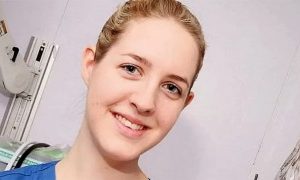
Jurors in the trial of murder-accused nurse Lucy Letby have been told they “must decide where the truth lies”.
Judge Mr Justice James Goss has started summing up the evidence in the case before the jury retires to consider its verdicts.
Ms Letby is accused of murdering seven babies and attempting to murder 10 others at the Countess of Chester Hospital between 2015 and 2016.
She denies all of the charges against her at Manchester Crown Court.
The jury, of four men and eight women, has listened to evidence over the past eight months, including allegations Ms Letby, originally from Hereford, deliberately injected some infants with air or poisoned them with insulin.
Mr Justice Goss told the jury: “In 2015 and 2016, there was a significant rise in the number of babies who suffered sudden and unexpected collapses in the neonatal unit.”
He said “as the number of such cases increased, the clinicians started to think the unthinkable as it was described” that it was “the consequence of deliberate harmful acts”.
Mr Justice Goss reminded the jury it was the prosecution’s case these were “not natural events but were caused by the defendant using various means to harm babies intending that they should die”.
But he said it was the defendant’s case that “she was a dedicated, caring and conscientious nurse who never did anything to harm any child”.
‘No previous convictions’
Outlining further legal directions, Mr Justice Goss said it was for the jury to consider the 22 charges and decide what evidence was “significant and relevant” to each count.
“The defendant has never been in trouble with the police and has no criminal convictions, reprimands and cautions recorded against her,” he said.
“Not having any previous convictions does not provide someone with a defence but it is something you should take into account in her favour in two ways.
“First, it may make it less likely that she would deliberately harm any babies she cared for at the hospital.
“Second, it is also something that you should consider in her favour when deciding her credibility, in other words, whether she was being truthful in her evidence to you about these events.
“It is entirely for you decide what weight, if any, you attach to the defendant’s previous character.”
Mr Justice Goss added there had “inevitably been delays” between the alleged offences, the taking of witness statements and giving evidence at the trial.
He said all witnesses including Ms Letby had been dependant, in part, on “contemporaneous records and notes”.
“For all, the passage of time is likely to have affected memories about exactly what happened and the ability to recall all details of events, even with the benefit of contemporaneous records,” he said.
“So make appropriate allowances for that and take account of the delay and, in particular, any disadvantage caused to the defendant in relation to being able to recall with precision what took place and remembering details which may have assisted her.”
Mr Justice Goss also told the jury witnesses who gave evidence from behind a screen should be judged in “exactly the same way as you judge any other witness”.
He added this should also be applied to those who gave evidence via a videolink as this was a “cost and climate-saving measure”.
He told the jury he would “provide a narrative of the evidence, endeavouring to put matters in sequence and in context” before summarising the evidence of Child A, B and C.
Mr Justice Goss is expected to spend a total of four days summing up the case, telling the jury it was for them to determine “who is and who isn’t telling you the truth”.
The trial continues.
Source – BBC News


Share your thoughts